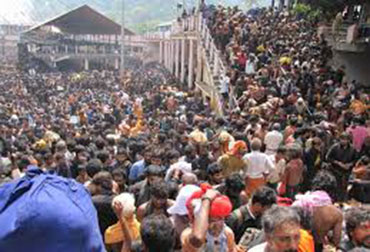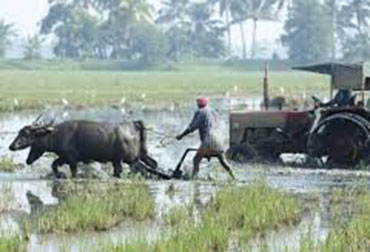

Mass Gathering, Health Domains And Health System Responsiveness
Mass Gathering, Health Domains And Health System Responsiveness
A study of Sabarimala pilgrimage in Kerala
Global Institute of Public Health is undertaking a unique research on Mass Gathering and Health in Indian context. Funded by Government of India's Apex body on health research-Indian Council For Medical Research(ICMR), 'Mass gathering, Health domains and health system responsiveness - A study of Sabarimala Pilgrimage' looks into the considerable challenges in terms of communicable and non-communicable disease surveillance, emergency preparedness, environmental health, vaccination crowd management etc. Health services are normally tuned to meet routine requirements and provide services in a limited sphere. Such services are unusually strained during mass gathering and may require major strengthening of existing services and potentially the introduction of new or enhanced methods for managing disease and other public health emergencies.
Principal Investigator: Prof. Dr. K. RajasekharanNayar, Professor and Head, Global Institute of Public Health, Thiruvananthapuram, India
Co-Investigators:
Dr Mohan Das, Fellow, Santhigiri Social Research Institute, Thiruvananthapuram, India
Dr Muhammed Shaffi, Assistant Professor of Public Health, Global Institute of Public Health, Thiruvananthapuram, India
Duration of Research Project: Two Years
Objectives
1. Explore the three domains with respect to mass gathering ie. bio-medical, environmental and psycho-social problems at various loci along the pilgrimage trail (beginning, mid and end points).
2. Document illness episodes and its socio-demographic correlates at these locations.
3. Undertake a risk assessment and need analysis with respect to health and health services
4. Study perceptions and responses of the people towards health and health services needs
5. Prepare plans for mitigating health problems and for scaling up health services
Summary
Mass gathering for religious and spiritual purposes has been in focus due to extremely high rates of mortality and injuries resulting from outbreak of diseases and stampedes. This has become a recurrent phenomenon in a number of religious congregations including yatras, Kumbhmelas, holy darshans and shrine-specific special occasions.The Ram Janki temple stampede in 2010 which killed 63 people highlighted the lack of high quality epidemiological data (BurkleJr and Hsu, 2011). One of the most recent such tragedies took place in Ratangarh temple in Datia district of Madhya Pradesh on 13thOctober, 2013 in which about 115 people died and many injured (Hindustan Times, October 17, 2013).
Undertaking systematic studies on the phenomenon of mass gathering would help in preventing mass fatalities in future. Under-reporting of human stampedes is a serious problem which is revealed in one of the very few analyses undertaken in India of around 40 human stampedes between 2001 and 2010 (Ngai et al, 2013). Although the focus of this research was to compare two search models to test their effectiveness in capturing maximum number of episodes, it was found through statistical analysis that religious and political events had a higher relative number of deaths in stampedes.
Mass gathering poses considerable challenges in terms of communicable and non-communicable disease surveillance, emergency preparedness, environmental health, vaccination crowd management etc. Health services are normally tuned to meet routine requirements and provide services in a limited sphere. Such services are unusually strained during mass gathering and “may require major strengthening of existing services and potentially the introduction of new or enhanced methods for managing disease and other public health emergencies. A review of literature shows the immense opportunity to initiate the process of knowledge generation in the area of MG health in India.
Given the paucity of information in the area of MG health, the effort will be to generate a body of knowledge regarding the three domains such as bio-medical, environmental and psychosocial problems with the fundamental aim of strengthening health services and enhancing health system responsiveness.
To know more about this work, please write to krnayar@gmail.com

